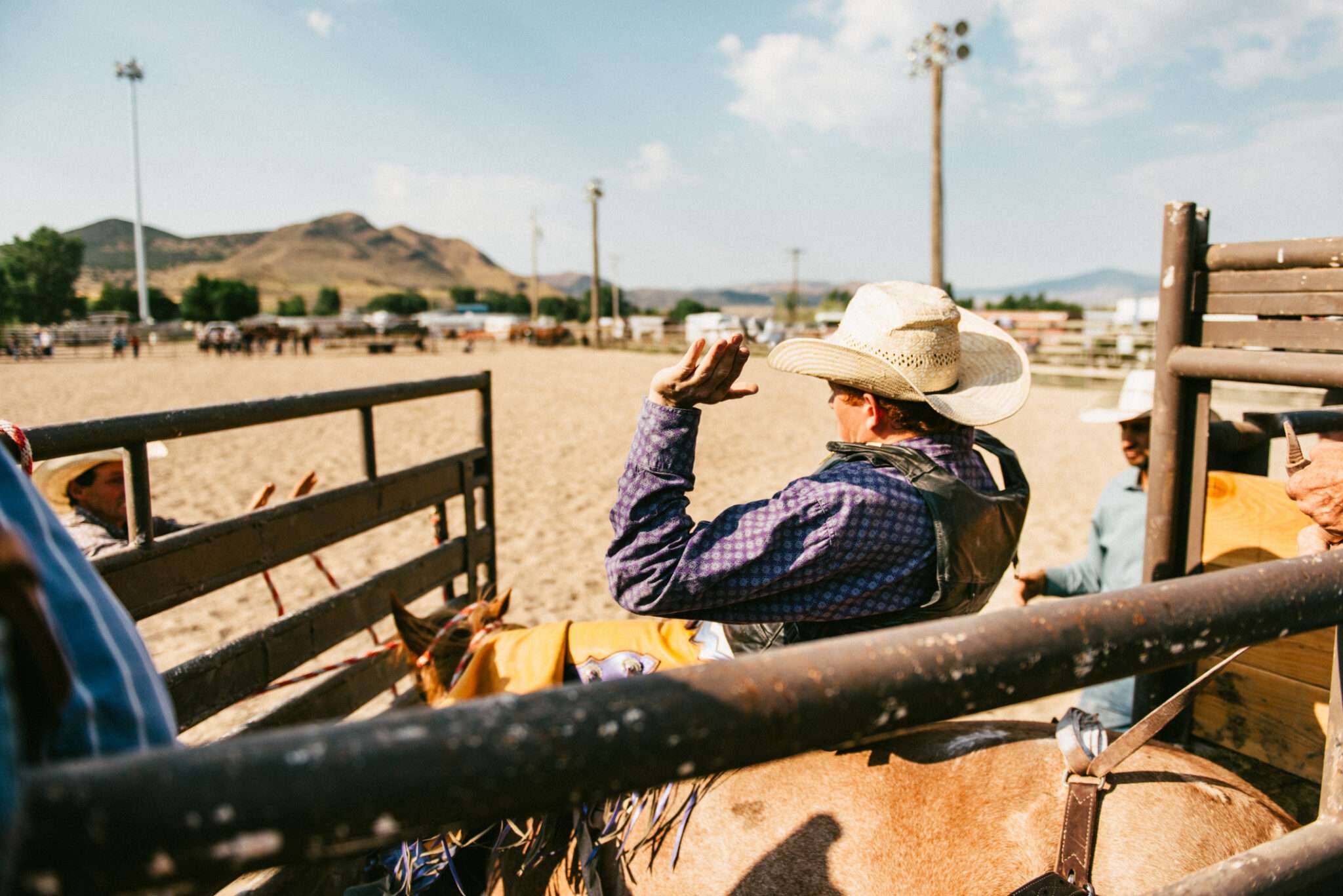
By SAM FOGLESONG
Kansas Reflector
Last month I attended patriotic night at the Ellis County Fair. I turned up just after 6:30 p.m. and ordered two stale hot dogs. The main event wouldn’t start until 8 p.m. so I ate them while watching sheep showmanship from a nearby picnic table.
After eating and wandering through the petting zoo, I made my way to the main arena, where the setting sun cast a warm glow on the bleachers and surrounding scenery. In the distance, a single pumpjack labored up and down on a small grassy hill. It was an picturesque setting for my first rodeo.
The night began with a prayer and the introduction of the rodeo queens. In his prayer, the announcer gave thanks for, among other things: being an American, owning a gun and the freedom to enjoy the rodeo.
Next, the rodeo queens, one of whom was as young as 10 years old, galloping around the arena’s perimeter on horseback with the flags of the rodeo’s corporate sponsors rippling in the wind behind them. State Farm Insurance, Ashley Home Furniture and Midwest Energy were among the company names I recognized.
Flying the flags of large corporations and an insurance company struck me as antithetical to the daring and rugged independence that I associated with the cowboy culture of the West.
With this one observation, I began to wonder about the dissonance between our romanticized idea of the cowboy and the Wild West and the rodeo I had come to see. Were we paying homage to something that was long gone or engaging in the fantasy that it still existed?
I worried that we might be doing both.
I contemplated as I looked around at my fellow audience members and took in the first event, steer wrestling or “bulldogging” as it is also called. In this event, a cowboy on horseback chases down a young steer, dismounts at speed, grabs the creature by the neck and wrestles it to the ground. I admired the sportsmanship and athleticism on display, while silently chuckling at the idea that we were playing with our food.
The end of the event brought a short interlude, during which audience members streamed toward the concession stand. They returning minutes later arms laden with beer, hot dogs and cheeseburgers wrapped in tin foil.
Indulgence in snack and drink is by no means unique to American sporting events, but it made me think. The opening prayer at the rodeo was a prayer of gratitude; gratitude for freedom, yes, but also for the freedom to indulge. The freedom to indulge in gun ownership and events like the rodeo.
This orgy of snacking and drinking combined with the corporate sponsors and glaring stadium lights seemed so at odds with the image of a lone cowboy, recently supped on a bowl of beans, climbing into his bedroll beneath a starry sky.
The more I thought about it, the more ironic it seemed. The indulgence, the excess, the corporate sponsors, all represented the very things that killed the Wild West.
The desire for more — more land, more beef, more money — pushed small ranches increasingly into the hands of large corporate farms.
Most of the prairie and grasslands that once bore witness to great cattle drives, outlaws and gunslingers has been dissected and bought up. Today, 98% of land in Kansas in privately owned. Cattle now crowd behind steel gates; their movements governed more by boardroom agricultural elites than by the rains and changing seasons.
As I watched the rodeo, I felt that I was witnessing a spiritually neutered version of the American cowboy. The roping skills and horsemanship were still there, but the spiritual independence of the cowboy roaming across the plains had been stripped away by the business interests that now sponsored its commemoration.
If I had been witnessing a conscious commemoration of the now-expired life of the cowboy and the West, I would have been content with my rodeo experience. But instead, I felt that the audience was indulging in a double truth: enjoying the fruits of the system that killed the cowboy while pretending that the spirit and terrain of his existence lingered.
In the end I have mixed emotions. On the one hand, the idea of American West shouldn’t be reduced to my romantic imagination. It was a brutal time of disease, genocide and hardship. But the spiritually barren landscape of corporate farming and parceled land offers poor consolation.
I find it hard to fault people for seeking pleasure and solace in their cultural heritage. I enjoyed seeing the smiling faces and the pleasure people clearly derived from the rodeo.
The spirit of the Wild West is not likely to be resurrected, especially when the economic forces preventing its resurrection are so robust. But what I hope for is an acknowledgment of where we stand in relation to the ideal and the forces that killed it. Doing that brings us far closer to the spirit of the cowboy than engaging in the fantasy that it still exists.
Sam Foglesong is a scholar of African Studies and a writer who lives in Hays.
Through its opinion section, Kansas Reflector works to amplify the voices of people who are affected by public policies or excluded from public debate. Find information, including how to submit your own commentary, here.






